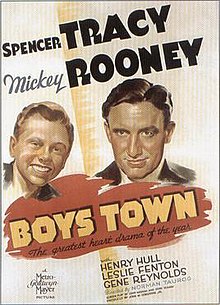
Spencer Bonaventure Tracy was an American actor. He was known for his natural performing style and versatility. One of the major stars of Hollywood's Golden Age, Tracy was the first actor to win two consecutive Academy Awards for Best Actor from nine nominations. During his career, he appeared in 75 films and developed a reputation among his peers as one of the screen's greatest actors. In 1999, the American Film Institute ranked Tracy as the 9th greatest male star of Classic Hollywood Cinema.
Boys Town, officially Father Flanagan's Boys' Home, is a non-profit organization based in Boys Town, Nebraska, dedicated to caring for children and families.

Love Finds Andy Hardy is a 1938 American romantic comedy film that tells the story of a teenage boy who becomes entangled with three different girls all at the same time. It stars Mickey Rooney, Lewis Stone, Fay Holden, Cecilia Parker, Judy Garland, Lana Turner, Ann Rutherford, Mary Howard and Gene Reynolds.

Mickey Rooney was an American actor, producer, radio entertainer, and vaudevillian. In a career spanning nearly nine decades, he appeared in more than 300 films and was among the last surviving stars of the silent-film era. He was the top box-office attraction from 1939 to 1941, and one of the best-paid actors of that era. At the height of a career marked by declines and comebacks, Rooney performed the role of Andy Hardy in a series of 16 films in the 1930s and 1940s that epitomized mainstream United States self-image.

Big Top Pee-wee is a 1988 American comedy film directed by Randal Kleiser. A stand-alone sequel to Pee-wee's Big Adventure (1985), the film stars Paul Reubens as Pee-wee Herman with Susan Tyrrell, Kris Kristofferson, Penelope Ann Miller, and Valeria Golino in supporting roles. The original music score is composed by Danny Elfman. It was released on July 22, 1988, and grossed $15 million against a $20 million budget. A stand-alone sequel, Pee-wee's Big Holiday, was released in 2016.

Frederick Cecil Bartholomew, known for his acting work as Freddie Bartholomew, was an English-American child actor. One of the most famous child actors of all time, he became very popular in 1930s Hollywood films. His most famous starring roles are in Captains Courageous (1937) and Little Lord Fauntleroy (1936).
The following is a complete list of the 220 Our Gang short films produced by Hal Roach Studios and/or Metro-Goldwyn-Mayer between 1922 and 1944, numbered by order of release along with production order.

Right Rev. Monsignor Edward Joseph Flanagan was an Irish-born priest of the Catholic Church in the United States, who served for decades in Nebraska. After serving as a parish priest in the Catholic Diocese of Omaha, he founded the orphanage and educational complex known as Boys Town, located west of the city in what is now Boys Town, Douglas County, Nebraska. In the 21st century, the complex also serves as a center for troubled youth.
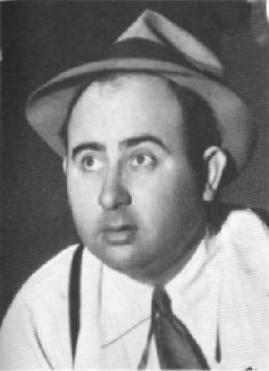
Norman Rae Taurog was an American film director and screenwriter. From 1920 to 1968, Taurog directed 180 films. At the age of 32, he received the Academy Award for Best Director for Skippy (1931), becoming the youngest person to win the award for eight and a half decades until Damien Chazelle won for La La Land in 2017. He was later nominated for Best Director for the film Boys Town (1938). He directed some of the best-known actors of the twentieth century, including his nephew Jackie Cooper, Spencer Tracy, Mickey Rooney, Judy Garland, Deanna Durbin, Fred Astaire, Gene Kelly, Deborah Kerr, Peter Lawford, Dean Martin, Jerry Lewis, and Elvis Presley. Taurog directed six Martin and Lewis films, and nine Elvis Presley films, more than any other director.
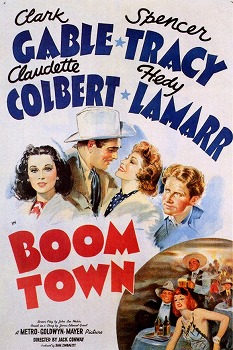
Boom Town is a 1940 American Western film starring Clark Gable, Spencer Tracy, Claudette Colbert, and Hedy Lamarr, and directed by Jack Conway. The supporting cast features Frank Morgan, Lionel Atwill, and Chill Wills. A story written by James Edward Grant in Cosmopolitan magazine entitled "A Lady Comes to Burkburnett" provided the inspiration for the film. The film was produced and released by Metro-Goldwyn-Mayer.

The Year Without a Santa Claus is a 1974 stop motion animated Christmas television special produced by Rankin/Bass Productions. The story is based on Phyllis McGinley's 1956 book of the same name. It is narrated by Shirley Booth and starring the voices of Mickey Rooney, Dick Shawn, and George S. Irving. It was originally broadcast on December 10, 1974, on ABC.

Follow Me, Boys! is a 1966 American drama film produced by Walt Disney Productions. It is an adaptation of the 1954 novel God and My Country by MacKinlay Kantor and was the final live action film produced by Walt Disney, who died two weeks later. The film stars Fred MacMurray, Vera Miles, Lillian Gish, Charles Ruggles and Kurt Russell, and is co-produced by Walt Disney and Winston Hibler, directed by Norman Tokar and written by Louis Pelletier. It is one of the few films featuring the Boy Scouts of America and is Disney's paean to the Boy Scouts. The title song "Follow Me, Boys!" was written by studio favorites Robert and Richard Sherman. After the film's production, the Boy Scouts of America considered using the song as their anthem, but efforts toward the end were dropped. The Boys' Life magazine included a teaser article of the film. Follow Me, Boys! was the first of ten Disney films in which Russell appeared over the next ten years. A DVD version was released on February 3, 2004 by Walt Disney Home Entertainment, although it is in 4:3 pan and scan format, not the original 1.66:1 wide screen aspect ratio.

Captains Courageous is a 1937 American adventure film directed by Victor Fleming and starring Freddie Bartholomew, Spencer Tracy, Lionel Barrymore and Melvyn Douglas. Based on the 1897 novel of the same name by Rudyard Kipling, the film had its world premiere at the Carthay Circle Theatre in Los Angeles. It was produced by Louis D. Lighton and made by Metro-Goldwyn-Mayer. Filmed in black and white, Captains Courageous was advertised by MGM as a coming-of-age classic with exciting action sequences.

Babes in Arms is the 1939 American film version of the 1937 coming-of-age Broadway musical of the same title. Directed by Busby Berkeley, it stars Mickey Rooney and Judy Garland, and features Charles Winninger, Guy Kibbee, June Preisser, Grace Hayes, and Betty Jaynes. It was Garland and Rooney's second film together as lead characters after their earlier successful pairing in the fourth of the Andy Hardy films. The film concerns a group of youngsters trying to put on a show to prove their vaudevillian parents wrong and make it to Broadway. The original Broadway script was significantly revamped, restructured, and rewritten to accommodate Hollywood's needs. Almost all of the Rodgers and Hart songs from the Broadway musical were discarded.
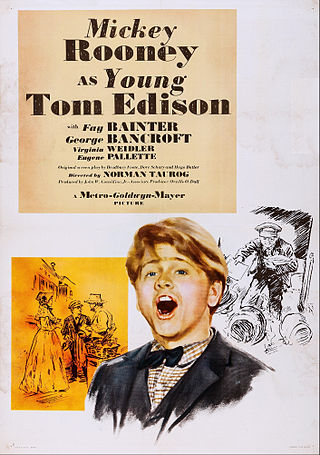
Young Tom Edison is a 1940 biographical film about the early life of inventor Thomas Edison directed by Norman Taurog and starring Mickey Rooney. The film was the first of a complementary pair of Edison biopics that Metro-Goldwyn-Mayer released in 1940. Edison, the Man, starring Spencer Tracy, followed two months later, completing the two-part story of Edison's life.

Robert Ball Watson, credited as Bobs Watson, was an American actor and Methodist minister.
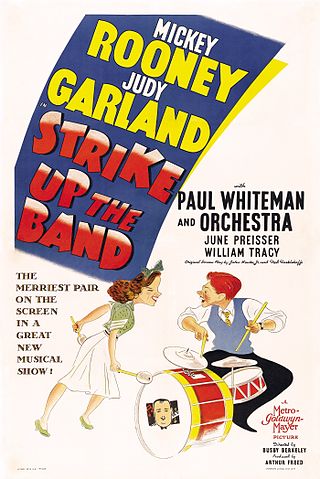
Strike Up the Band is a 1940 American musical film produced by the Arthur Freed unit at Metro-Goldwyn-Mayer. The film was directed by Busby Berkeley and stars Mickey Rooney and Judy Garland, in the second of a series of musicals they co-starred in, after Babes in Arms, all directed by Berkeley. The story written for the 1927 stage musical Strike Up the Band, and its successful 1930 Broadway revision, bear no resemblance to this film, aside from the title song.

Men of Boys Town is a 1941 American drama film directed by Norman Taurog and written by James Kevin McGuinness. It is a sequel to the 1938 film Boys Town. The film stars Spencer Tracy, Mickey Rooney, Bobs Watson, Larry Nunn, Darryl Hickman and Henry O'Neill. The film was released on April 11, 1941, by Metro-Goldwyn-Mayer.

Lord Jeff is a 1938 MGM film, set in England, starring Freddie Bartholomew as a spoiled orphan who has gotten mixed up with some crooks, but gets set straight by a stint in a mercantile marine vocational school for orphaned boys.
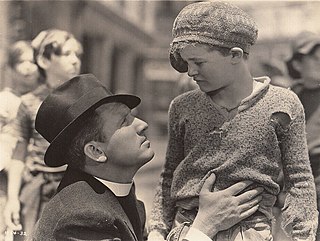
Martin Spellman IV was an American child actor active in films during the 1930s and 1940s.
